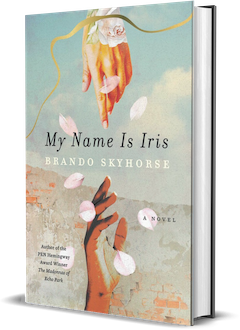My Name Is Iris
by Brando Skyhorse
My Name Is Iris by Brando Skyhorse (The Madonnas of Echo Park; Take This Man) is a chilling near-reality dystopian novel, set in an unnamed state that resembles California (and is called the "Golden State"). Protagonist Iris Prince is a second-generation Mexican American whose parents view her birthright as a gift and use the refrain "you were born here" to shame her whenever they feel her bad behavior shows a lack of gratitude. ("I am a second-generation Mexican-American daughter of Mexican immigrants, meaning that of course I was ungrateful.") Born Inés Soto, she was glad to have her first name simplified by white schoolteachers, and then to take her husband's last name. Iris is proud to be a rule follower, her highest ambition to blend in.
When the novel opens, Iris Prince has just left Alex, her husband of 16 years, and is determined to finally build the sanitized, magazine-cover life she's dreamed of: a new house in a suburban neighborhood on a cul-de-sac, a new school for her nine-year-old daughter, Melanie. She has shunned her parents' low-income home in a Spanish-speaking neighborhood (where her younger sister still lives, annoying Iris with her activism) and avoids Alex's overtures at co-parenting or getting back together. Iris feels that her real life--coffee clubs, gardening, and white picket fences--is about to begin.
Then one morning, she looks out of her lovely new bay window to find that a wall has sprung up in her front yard. It seems permanently fixed, and no one but Iris and Melanie can see it. Her realtor and contractors claim the wall must have been there all along, until gaslit Iris wonders, "Who was I to say otherwise?" And, impossible as it is, the wall seems to be growing.
Meanwhile, a new piece of wrist-wearable tech called "the band" is sweeping across the state. Iris herself voted in favor of the proposition that established this technology as a paper-saving, easy identification to "facilitate paying for and receiving state and public services, act as a drivers' license,... help users regulate a household's water usage and garbage output, serve as proof of residency for your child's enrollment in school, and potentially save the state millions of dollars." But it turns out that, regardless of citizenship, one must have a parent born in the United States to qualify for a band. Iris's confidence in her place in society is shaken. "Wear your bands and prove you belong here," says the propaganda. Hatred, bigotry and intolerance quickly swell into violence. "Somehow, in an overnight or two, my social contract had been renegotiated. Politeness vanished." Iris's loyalties are challenged: she has long associated herself with law and order and the establishment, but those forces have turned against her, despite all her rule-following. Each morning she drops her daughter off at school, the band's seductive glow encircling Mel's slim wrist--due to Alex's birthright, Mel qualifies for the privileges of the band. But Iris fears for her home and her job; her mother has been fired for her bandless status, and the family is in jeopardy. Under these pressures, Iris will have to consider just what she'll risk to protect her hard-won sense of identity.
Skyhorse seeds his text with plenty of Spanish-language dialogue, especially with Iris's parents and sister; non-Spanish-speaking readers will easily use context clues. In addition to this lovely linguistic texture, Skyhorse imbues his all-too-lifelike novel with fine details--Iris's anti-nostalgia for a defunct supermarket, her love for bland ritual--and judicious use of highly impactful notes of the mysterious or the surreal. These twists of magical realism include a ghost from a childhood trauma who haunts Iris in her vulnerable moments, and of course the wall itself, which grows and morphs overnight. The wall is ever-present, at one point "almost like a co-parent," even as it literally deprives her home of the sun's light and heat, as well as her sense of security: "Later, when I would dream, I dreamed of walls."
My Name Is Iris is terrifying with its proximity to reality. Iris is perhaps preoccupied with labels and appearances (as the book's title forecasts), and not the most likable protagonist, initially; but her flaw is simply in seeking the American dream as it's been advertised. Despite her obedience--teaching her child to always trust the police, adhering strictly to HOA rules--the world she's trusted has turned on her. What can one woman do to fight a state security regime or a magically self-constructing wall?
This gripping dystopia poses difficult but important questions about the world as we know it and the few small steps it takes to slide into horror. Intolerance and xenophobia lurk in the most seemingly benign corners. My Name Is Iris is part social commentary and part thoughtful consideration of themes that include family, identity, transitions, perspectives, and hope. In addition to being an engrossing, discomfiting tale, this will make an excellent book club selection and fuel for tough conversations. --Julia Kastner








_Eric_van_den_Brulle.jpg)